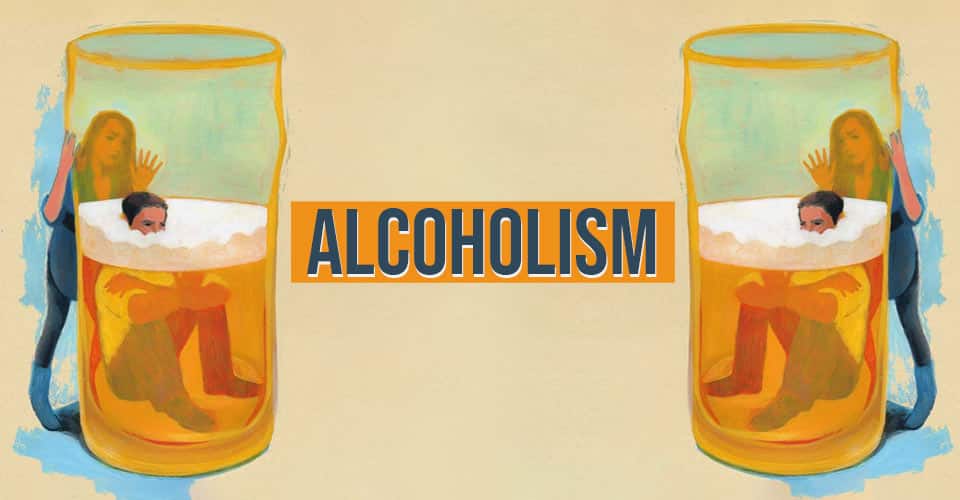Alcoholism is a chronic and progressive mental health condition characterized by the compulsive use of alcohol despite long-term consequences. People with alcoholism generally develop a strong desire to drink and have difficulty controlling their alcohol intake. It is also known as alcohol use disorder (AUD).
What Is Alcoholism?
Alcoholism is a substance use disorder 1 Pasha, A. K., Chowdhury, A., Sadiq, S., Fairbanks, J., & Sinha, S. (2020). Substance use disorders: diagnosis and management for hospitalists. Journal of community hospital internal medicine perspectives, 10(2), 117–126. https://doi.org/10.1080/20009666.2020.1742495 that involves an uncontrollable urge to consume alcohol, despite negative physical or emotional consequences. Alcoholism can lead to various social, economic, and health problems.
A person suffering from this condition is referred to as an “alcoholic 2 Sudhinaraset, M., Wigglesworth, C., & Takeuchi, D. T. (2016). Social and Cultural Contexts of Alcohol Use: Influences in a Social-Ecological Framework. Alcohol research : current reviews, 38(1), 35–45. “. However, alcohol abuse is not a recognizable diagnosis until it develops into a full-blown clinical condition called alcohol use disorder.
Individuals with alcoholism struggle to control their drinking and often spend a significant amount of time consuming or thinking about alcohol. While moderate drinking is generally not harmful, excessive alcohol consumption can lead to physical effects such as loss of coordination, vision, balance, and speech.
Alcohol can also impair brain function and cause unconsciousness. Excessive alcohol intake can damage various organ systems 3 Wang, H., Xu, H., Li, W., Li, B., Shi, Q., Ma, K., Xiao, B., & Chen, L. (2019). Forensic appraisal of death due to acute alcohol poisoning: three case reports and a literature review. Forensic sciences research, 5(4), 341–347. https://doi.org/10.1080/20961790.2019.1572259 including the brain, heart, liver, pancreas, and immune system. Alcohol poisoning 4 Morteza Bagi, H. R., Tagizadieh, M., Moharamzadeh, P., Pouraghaei, M., Kahvareh Barhagi, A., & Shahsavari Nia, K. (2015). Epidemiology of Alcohol Poisoning and Its Outcome in the North-West of Iran. Emergency (Tehran, Iran), 3(1), 27–32. can be fatal in cases of overdose.
Alcohol Use Disorder (AUD)
Alcohol use disorder (AUD) is a chronic condition 5 Nehring, S. M., & Freeman, A. M. (2020). Alcohol Use Disorder. PubMed; StatPearls Publishing. Available from: https://www.ncbi.nlm.nih.gov/books/NBK436003/ characterized by a compulsive urge to consume alcohol despite negative physical, psychological, and social consequences.
It is not a sign of weakness or lack of willpower, but rather a complex behavioral and impulse control disorder influenced by various factors such as genetics, environment, and life experiences.
Alcohol intoxication
Alcohol intoxication 6 Vonghia, L., Leggio, L., Ferrulli, A., Bertini, M., Gasbarrini, G., Addolorato, G., & Alcoholism Treatment Study Group (2008). Acute alcohol intoxication. European journal of internal medicine, 19(8), 561–567. https://doi.org/10.1016/j.ejim.2007.06.033 is a state in which an individual has consumed alcohol to a level that it has significantly impaired their physical and mental functions.
The severity of the effects of alcohol intoxication depends on various factors such as the amount of alcohol consumed, the individual’s tolerance level, and the speed at which the alcohol was consumed. Symptoms of alcohol intoxication include:
- Slurred speech
- Impaired judgment and coordination
- Blurred vision
- Memory impairment
- Loss of consciousness or coma (in severe cases)
Alcohol withdrawal
Alcohol withdrawal 7 Newman, R. K., Stobart, M. A., & Gomez, A. E. (2019, October 27). Alcohol Withdrawal. Nih.gov; StatPearls Publishing. Available from: https://www.ncbi.nlm.nih.gov/books/NBK441882/ refers to the set of symptoms that occur when an individual who is dependent on alcohol abruptly stops or significantly reduces their alcohol intake. It ranges from mild to severe and can be life-threatening in severe cases. Symptoms of alcohol withdrawal include:
- Chronic anxiety
- Restlessness
- Tremors
- Sweating
- Nausea
- Vomiting
- Headache and seizures
- Life-threatening conditions like confusion, hallucinations, fever, etc. (in extreme cases)
Read More About Withdrawal Here
Prevalence Of Alcoholism
Globally, alcoholism affects 107 million people 8 Alcohol Facts and Statistics | National Institute on Alcohol Abuse and Alcoholism (NIAAA). (n.d.). Www.niaaa.nih.gov. Available from: https://www.niaaa.nih.gov/alcohols-effects-health/alcohol-topics/alcohol-facts-and-statistics . Over 3 million deaths 9 Glantz, M. D., Bharat, C., Degenhardt, L., Sampson, N. A., Scott, K. M., Lim, C. C. W., Al-Hamzawi, A., Alonso, J., Andrade, L. H., Cardoso, G., De Girolamo, G., Gureje, O., He, Y., Hinkov, H., Karam, E. G., Karam, G., Kovess-Masfety, V., Lasebikan, V., Lee, S., Levinson, D., … WHO World Mental Health Survey Collaborators (2020). The epidemiology of alcohol use disorders cross-nationally: Findings from the World Mental Health Surveys. Addictive behaviors, 102, 106128. https://doi.org/10.1016/j.addbeh.2019.106128 are attributable to alcohol use each year, with 7.7 percent of men and 2.6 percent of women dying from alcohol use disorder.
Alcohol use is also a leading risk factor for premature mortality and disability among people aged 15 to 49 years old 10 Griswold, M. G., Fullman, N., Hawley, C., Arian, N., Zimsen, S. R. M., Tymeson, H. D., Venkateswaran, V., Tapp, A. D., Forouzanfar, M. H., Salama, J. S., Abate, K. H., Abate, D., Abay, S. M., Abbafati, C., Abdulkader, R. S., Abebe, Z., Aboyans, V., Abrar, M. M., Acharya, P., & Adetokunboh, O. O. (2018). Alcohol use and burden for 195 countries and territories, 1990–2016: a systematic analysis for the Global Burden of Disease Study 2016. The Lancet, 392(10152), 1015–1035. https://doi.org/10.1016/s0140-6736(18)31310-2 . The consumption of alcohol and alcoholism may also have many correlations with occupational roles 11 Olkinuora M. (1984). Alcoholism and occupation. Scandinavian journal of work, environment & health, 10(6 Spec No), 511–515. https://doi.org/10.5271/sjweh.2292 in industries like hospitality or healthcare.
Symptoms Of Alcoholism
Research 12 National Collaborating Centre for Mental Health (UK. (2011). ALCOHOL DEPENDENCE AND HARMFUL ALCOHOL USE. Nih.gov; British Psychological Society. Available from: https://www.ncbi.nlm.nih.gov/books/NBK65500/ attributes the symptoms of alcohol use disorder to the following:
- Having alcohol cravings, withdrawal symptoms, and tremors
- Drinking alone or in isolation
- Consuming higher amounts of alcohol to feel the effects and developing a high tolerance 13 Elvig, S. K., McGinn, M. A., Smith, C., Arends, M. A., Koob, G. F., & Vendruscolo, L. F. (2021). Tolerance to alcohol: A critical yet understudied factor in alcohol addiction. Pharmacology, biochemistry, and behavior, 204, 173155. https://doi.org/10.1016/j.pbb.2021.173155
- Exhibiting violent or angry behaviors when questioned about drinking habits
- Lapses in memory after a night of drinking
- Poor eating habits and neglect of personal hygiene
- Absenteeism 14 Ramanan, V. V., & Singh, S. K. (2016). A study on alcohol use and its related health and social problems in rural Puducherry, India. Journal of family medicine and primary care, 5(4), 804–808. https://doi.org/10.4103/2249-4863.201175 from work or school due to alcohol use
- Inability to control alcohol intake
- Making excuses to drink alcohol
- Physical health symptoms related to alcoholic ketoacidosis or cirrhosis of the liver 15 Alcoholic liver disease: Symptoms, treatment, and causes. (n.d.). Www.medicalnewstoday.com. Available from: https://www.medicalnewstoday.com/articles/215638
- Ignoring important social, occupational, or recreational activities and continue drinking despite many issues due to alcohol intake
Stages Of Alcoholism
Alcoholism typically develops over time. The stages of alcoholism can vary from person to person, but generally, the following stages 16 Becker H. C. (2008). Alcohol dependence, withdrawal, and relapse. Alcohol research & health : the journal of the National Institute on Alcohol Abuse and Alcoholism, 31(4), 348–361. may be observed:
- Pre-alcoholic stage, in which a person experiments with alcohol as a social or stress-relieving drink without exhibiting signs of addiction
- Early-stage, in which a person begins to use alcohol heavily, thereby experiencing cravings and developing tolerance for the same
- Middle-stage, in which the affected person’s drinking habits become more problematic and they experience withdrawal symptoms
- Late-stage, in which a person develops a full-blown alcohol use disorder and suffers from serious mental and physical health problems
Read More About End Stage Alcoholism Here
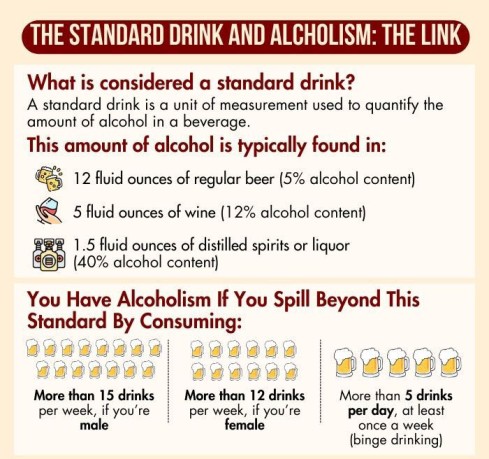
Types Of Alcoholism
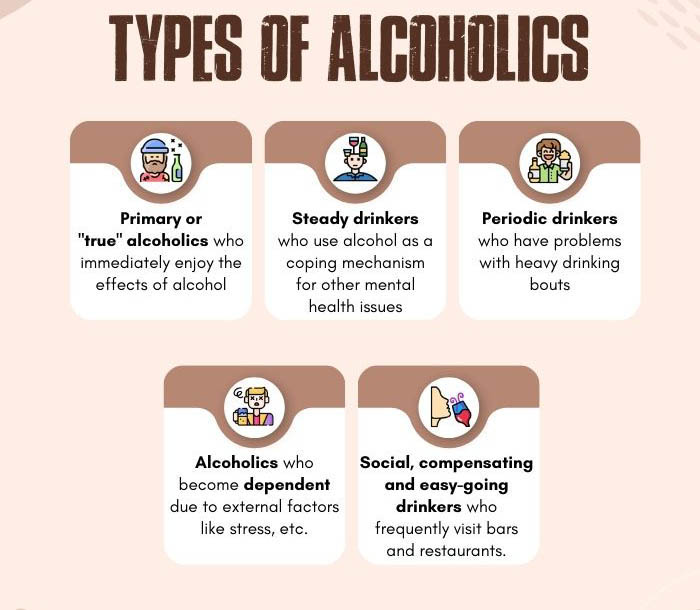
Some of the common types 17 Babor T. F. (1996). The Classification of Alcoholics: Typology Theories From the 19th Century to the Present. Alcohol health and research world, 20(1), 6–14. of alcoholism include:
1. Type I alcoholism
This type of alcoholism is characterized by a gradual onset of drinking, often starting in adolescence or early adulthood. Type I alcoholism is hereditary and tends to run in families.
2. Type II alcoholism
This type of alcoholism typically develops later in life, mostly as a response to stressors like negative life events, trauma, or social isolation. It is associated with more severe symptoms, such as blackouts, physical dependence, and withdrawal symptoms.
3. Binge drinking
This type of alcoholism is marked by the consumption of large amounts of alcohol in a short time, typically with the intention of getting drunk. Binge drinking can lead to a range of negative consequences, including accidents, injuries, and alcohol poisoning.
4. Problem drinking
This type of alcoholism is defined by a problematic pattern of alcohol use that causes problems in a person’s life, such as relationship problems, poor work or school performance, or legal problems. However, problem drinking may not meet the diagnostic criteria for alcohol use disorder (AUD).
What Causes Alcoholism?
Alcoholism can be attributed to a combination of genetic and psychosocial factors 18 Wackernah, R. C., Minnick, M. J., & Clapp, P. (2014). Alcohol use disorder: pathophysiology, effects, and pharmacologic options for treatment. Substance abuse and rehabilitation, 5, 1–12. https://doi.org/10.2147/SAR.S37907 like:
- Genetic heritability
- Exposure to alcohol at an early age through peer pressure, etc.
- Negative developmental experiences related to bullying, parental abandonment, etc.
- Stressful life events like unemployment, financial losses, etc.
- Social isolation
- Predisposed mental health conditions like depression, anxiety, post-traumatic stress disorder (PTSD), grief, etc.
- Personality traits, marked by low self-esteem, poor impulse control and psychological resilience, a genetic predisposition to substance use, etc.
Alcoholism And Mental Health
Alcoholism and mental health are closely related, as people with alcoholism also struggle with mental health conditions 19 Tembo, C., Burns, S., & Kalembo, F. (2017). The association between levels of alcohol consumption and mental health problems and academic performance among young university students. PloS one, 12(6), e0178142. https://doi.org/10.1371/journal.pone.0178142 such as:
- Depression [Read more]
- Anxiety [Read more]
- Social withdrawal
- Bipolar disorders [Read more]
- Schizophrenia [Read more]
- Post-traumatic stress disorder (PTSD) [Read more]
- Alcohol-induced psychosis [Read more]
- Substance use disorder (SUD)
- Memory disorders
- Sleep disorders [Read more]
- Eating disorders [Read more]
- Self-harm [Read more]
- Suicidality
Read More About Alcohol And Mental Health Here
Fatalities Of Alcoholism
Studies 20 Rehm, J., & Shield, K. D. (2013). Global alcohol-attributable deaths from cancer, liver cirrhosis, and injury in 2010. Alcohol research : current reviews, 35(2), 174–183. show that heavy alcohol use is a major contributor to premature deaths and disability worldwide. In fact, alcohol-related fatalities can be related to:
- Liver disease
- Cardiovascular and coronary diseases
- Cancer in the liver, breast, and colon
- Serious injury or accidental deaths by falls, car accidents, inability to handle heavy machinery, etc.
Diagnosing Alcohol Use Disorder (AUD)
Diagnosing alcohol use disorder (AUD) typically involves a comprehensive evaluation by a healthcare provider or addiction specialist. The diagnostic criteria (11 symptoms) for AUD are outlined in the Diagnostic and Statistical Manual of Mental Disorders (DSM-5) 21 National Institute on Alcohol Abuse and Alcoholism. (2017). Alcohol Use Disorder: A Comparison Between DSM–IV and DSM–5 | National Institute on Alcohol Abuse and Alcoholism (NIAAA). Nih.gov. Available from: https://www.niaaa.nih.gov/publications/brochures-and-fact-sheets/alcohol-use-disorder-comparison-between-dsm .
To be diagnosed, patients who screen positive for binge drinking or heavy alcohol use must experience at least two of these symptoms within a 12-month-period.
The accurate and timely diagnosis of AUD 22 Kranzler, H. R., & Soyka, M. (2018). Diagnosis and Pharmacotherapy of Alcohol Use Disorder: A Review. JAMA, 320(8), 815–824. https://doi.org/10.1001/jama.2018.11406 requires a clinical assessment (with clinical scales) from multiple informants, as well as structured diagnostic interviews with the affected person and his/her family members and friends.
A functional analysis of the sufferer’s behavior will not only assist in making an appropriate diagnosis but also aid in developing an effective treatment plan. Frequently, the treatment methodology is influenced by the severity of the symptoms of alcoholism and the presence of comorbid conditions.
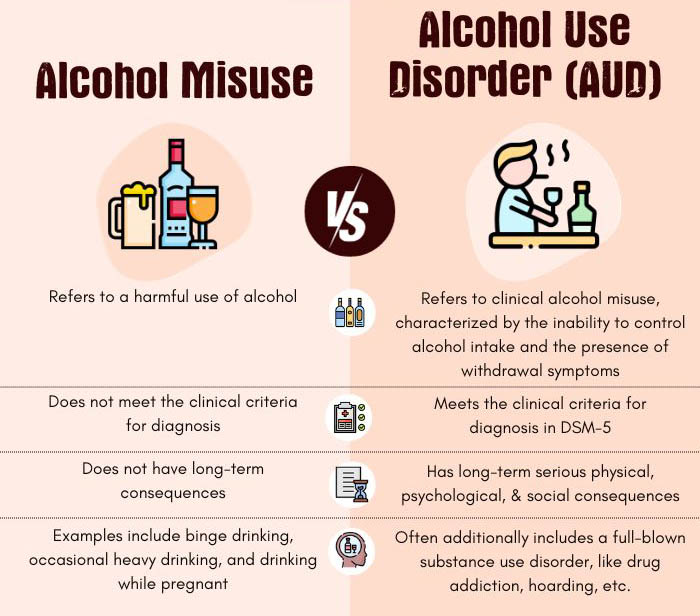
Treatment For Alcoholism
The treatment for alcoholism usually involves a combination of approaches that are individualized to meet each person’s specific needs and circumstances. These include:
- Psychotherapies 23 Miller, P. M., Book, S. W., & Stewart, S. H. (2011). Medical treatment of alcohol dependence: a systematic review. International journal of psychiatry in medicine, 42(3), 227–266. https://doi.org/10.2190/PM.42.3.b , like cognitive-behavioral therapy (CBT), motivational interviewing, and contingency management
- Medications for alcohol use disorder, such as disulfiram, naltrexone 24 Kranzler, H. R., & Soyka, M. (2018). Diagnosis and Pharmacotherapy of Alcohol Use Disorder: A Review. JAMA, 320(8), 815–824. https://doi.org/10.1001/jama.2018.11406 , etc.
- Group interventions, like family therapy, group-support programs, etc.
- In-patient alcoholism treatment programs, like anonymous or residential rehabilitation programs 25 What Types of Alcohol Treatment Are Available? (2019, July 25). NIAAA Alcohol Treatment Navigator. Available from: https://alcoholtreatment.niaaa.nih.gov/what-to-know/types-of-alcohol-treatment
- Holistic treatment options 26 Junyue, J., Siyu, C., Xindong, W., Qinge, X., Jingchun, Z., Liming, L., & Guohua, L. (2021). Complementary and Alternative Medicine for Substance Use Disorders: A Scientometric Analysis and Visualization of Its Use Between 2001 and 2020. Frontiers in psychiatry, 12, 722240. https://doi.org/10.3389/fpsyt.2021.722240 , involving yoga, meditation, acupuncture, or art therapy
Read More About Treatment For Alcoholism Here
Dealing With Alcoholism
Consider the following measures if you or someone you know need help while dealing with alcoholism:
- Recognize and acknowledge that you or your loved one has a problem with alcohol and needs help.
- Seek professional help 27 Palzes, V. A., Parthasarathy, S., Chi, F. W., Kline-Simon, A. H., Lu, Y., Weisner, C., Ross, T. B., Elson, J., & Sterling, S. A. (2020). Associations Between Psychiatric Disorders and Alcohol Consumption Levels in an Adult Primary Care Population. Alcoholism, clinical and experimental research, 44(12), 2536–2544. https://doi.org/10.1111/acer.14477 and consult an addiction specialist to determine the most appropriate treatment plan.
- Consider medication-assisted treatment that reduces alcohol cravings and helps you manage withdrawal symptoms.
- Participate in support group meetings 28 Wu, L. T., & Ringwalt, C. L. (2006). Use of alcohol treatment and mental health services among adolescents with alcohol use disorders. Psychiatric services (Washington, D.C.), 57(1), 84–92. https://doi.org/10.1176/appi.ps.57.1.84 .
- Develop a strong support system from people who can help you address your emotional and psychological issues throughout treatment and recovery.
- Recognize and avoid situations or people that may trigger alcohol cravings, such as bars or social events where alcohol is served.
- Establish clear and healthy boundaries with friends or family members who may enable or encourage alcohol use.
- Practice self-care by eating a healthy diet, exercising regularly, and practicing stress-reducing activities like meditation or yoga.
- Staying engaged in enjoyable leisure activities like journaling, gardening, etc.
- Stay committed to sobriety.
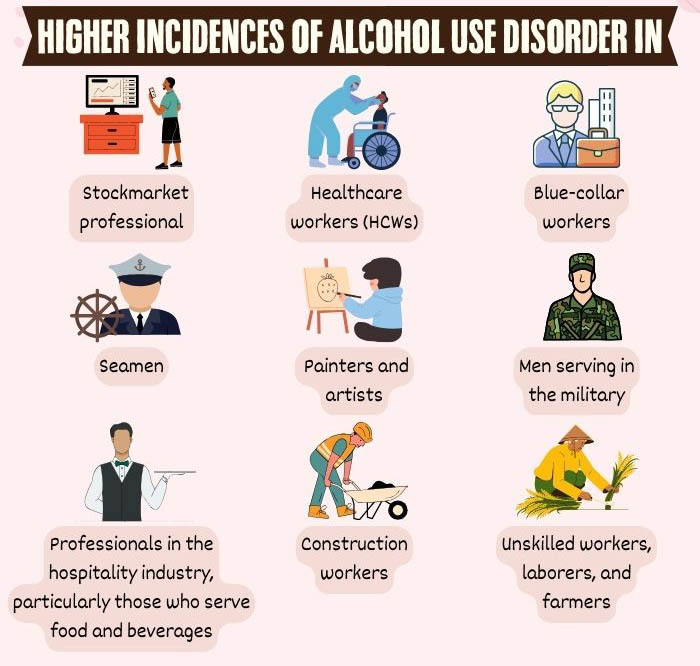
Takeaway
Overcoming alcohol addiction and achieving long-term recovery is challenging, but recovery is an ongoing process that requires commitment. Strategies such as being patient with oneself and celebrating small victories can help, as recovery can have its ups and downs. It’s important to recognize progress and accomplishments, no matter how small they may seem, in order to stay motivated on the path to sobriety.
At A Glance
- Alcoholism is a progressive mental health condition characterized by the compulsive use of alcohol, despite negative consequences.
- It is also known as alcohol use disorder (AUD).
- Alcoholism can have serious consequences for a person’s health, relationships, and daily functioning.
- Some common symptoms of alcoholism include drinking alone, engaging in risky behaviors, experiencing withdrawal symptoms, etc.
- The causes of alcoholism include genetic, environmental, and psychological factors.
- Treatment for alcoholism typically involves behavioral therapies, medications, and support groups.
Frequently Asked Questions (FAQs)
1. Is alcoholism hereditary?
Alcoholism has a hereditary component, as genetics and learned behavior in a psychosocial setting, may predispose someone to alcoholism.
2. Does alcoholism cause dementia?
Chronic heavy drinking can cause damage to the brain, which can result in cognitive impairment and neurological disorders like dementia.
3. How can you get help for alcoholism?
Acknowledge that you have a problem with heavy alcohol use. If possible, communicate to your loved ones that you are facing issues with drinking. Finally, avail therapy or in-patient treatment (like addiction rehabilitation) and participate in support groups.
4. Can you die of alcoholism?
Alcoholism can be a life-threatening condition which may lead to serious health problems (like liver disease), accidents, and injuries that can be fatal.

